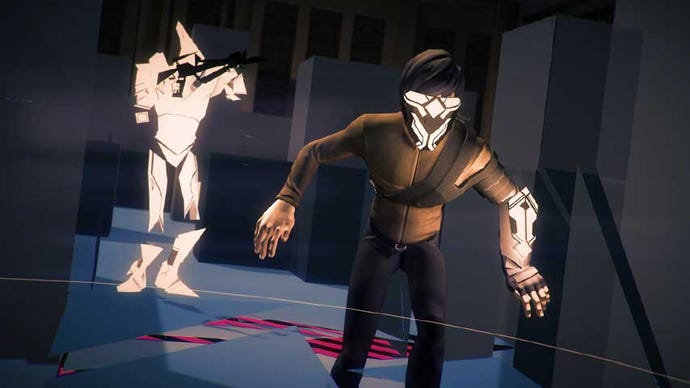We want to hear about more games like Volume
Volume is Metal Gear Solid meets Pac-Man meets a fever dream of future dystopia, gloriously polished and carefully paced.
Volume is an isometric stealth game in which players explore VR environments, avoiding detection by enemies and collecting gems in order to unlock the exit.
That's a very minimalistic description of the 100 levels of tense, strategic infiltration ahead of you. How every on-theme of me; if only my brief and functional outline conveyed as much and worked as well as Volume's spare, stylised aesthetic.
Like many stealth games, Volume carefully balances thinking and action. Each level is a puzzle, but once you've figured out the solution you still have to execute; those with confidence in their reflexes will have a better time of it. The majority of levels I encountered required split-second timing, forward-thinking or both.
I have not yet finished Volume, so I am trusting in it not going to s**t at the end and embarrassing me. I haven't finished it both because my Windows installation rolled over with its legs in the air, and because I'm not very good. I can't solve levels immediately. Every half dozen or so I hit one where I die over and over again and can't see any way forward.
When this happens I go away for a metaphorical smoko. While the Volume module of my brain is sprawled in an easy chair in a dressing gown, devouring candy cigars and staring into the distance, I do other things. Eventually the solution comes to me. I'll be playing something else - or reading a book, running and on one memorable occasion sleeping - when suddenly the answer crystallises in my brain, and I want to rush off and put it to the test immediately.
Because I'm terrible, these solutions are usually something like "try going left instead of right" or "just run past them" but I derive a great deal of satisfaction from coming up with them on my own rather than Googling. We'll see how long that lasts now that the game is in the wild and guides are becoming available, of course. Early levels are very linear and not especially challenging, but the difficulty definitely escalates, with more nefarious layouts and increasingly powerful enemies. But so too do the tools and tactics at your disposal increase.
Some later levels have multiple solutions, allowing you to choose freely between multiple gadgets. The leaderboards are testament to how good some people are at finding creative solutions and getting the timing perfectly right. If you're into competition or speed runs there's likely a great deal of longevity in battling your way to the top, and for everyone else the level editor should provide an ongoing stream of content.
I'm not especially interested in that. My focus is in the core story mode. The opening cinematic suggests an inevitable capture for our hero, but in the meantime, the interplay between Rob, villain Gisborne, and AI Alan is what keeps me coming back. The unfolding tale of corporate greed and the leveraging of national pride is hauntingly relevant to modern politics, as all good sci-fi is, and the numerous subplots invite the player to put the pieces together independently. It's a world you want to explore thoroughly, even as you recoil from its villains and look fearfully over your shoulder at real world analogues.
Most wonderfully, all this takes place in the most player-friendly way. Voiceovers pause when you complete levels or trigger an alert, and continue when it makes sense to do so. You don't ever have to stand about listening instead of playing, and you can't accidentally miss story content by pushing through the game too fast.
The story is delivered in careful drops, never too lengthy to bore you, always leaving you wanting to know a bit more. This wonderful pacing and non-intrusive delivery is all too uncommon in games, and Thomas Was Alone was probably the last really successful example. It's unfortunate for The Chinese Room that I was playing Volume and Everybody's Gone to the Rapture in the same week, really; the latter's crawling pace and passivity looks alarmingly old-fashioned compared to Bithell's smart approach to story-telling in games.
I can't get over how clever the whole thing seems, either; Bithell is a very funny man. It's full of little flourishes: callbacks to Robin Hood legends, cheeky nods, an open acknowledgement of the Pac-Man-style feel of some levels. Even the title, Volume, has multiple meanings.
And all of this is delivered in a calm, cheerful, very British tone, where the gravity of the themes is neither over- nor underplayed. You're charmed, of course, but this isn't surface charisma; Volume delivers a thoughtful and biting narrative.
We've got the best of both worlds here. Volume is an open-ended experience, offering community content and competition far beyond the scope of its 100 levels - but it's also a beautiful example of the old school dream of self-containment, not to mention the very rare achievement of a narrative that neither overwhelms nor takes a backseat to compelling gameplay. Top stuff.
Volume is now available on Mac, PC and PS4, with a cross-buy enabled Vita release due in a few weeks.







